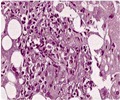Scarlet fever has claimed the life of at least one child while infecting thousands of others in Hong Kong and elsewhere in China, forcing the former to declare an outbreak.

Hong Kong authorities have recorded 40 new cases in the past few days, pushing the total number to 459 so far this year, the highest annual total in the city and more than three times the figure for the whole of 2010.
The boy -- who also had chicken pox -- developed a fever last Wednesday and was admitted to hospital on Sunday with symptoms of the illness.
His condition deteriorated rapidly and he died Tuesday morning, Thomas Tsang, controller of Hong Kong's Centre for Health Protection, said.
Classes have been suspended at the boy's kindergarten for a week, a first for Hong Kong following a scarlet fever death.
"The situation is rather serious at the moment," Tsang said Tuesday.
Advertisement
Hong Kong radio station RTHK reported that 49 people had contracted the illness in Macau, a former Portuguese colony about an hour by ferry from Hong Kong, with nine taken to hospital but no fatalities.
Advertisement
"Scarlet fever is in its peak season and may continue to be widespread for a prolonged period of time, possibly the whole summer," Tsang said.
Local scientists said the outbreak may be linked to a deadly new strain of the disease which could make it more contagious than in the past.
A unique gene fragment was present in the bacteria's genome "which might contribute to increased transmissibility of this strain," said a health protection centre statement, released late Monday.
Scarlet fever mainly affects children between the ages of two and eight. Symptoms include fever, sore throat, rashes and a "strawberry coloured" tongue, and usually subside within 48 hours with appropriate antibiotic treatment.
The new strain, discovered by researchers at the University of Hong Kong, appears to be resistant to antibiotics traditionally used to fight the illness.
Children under 10 made up 93 percent of the reported cases and most of the infections were mild, the statement said.
Hong Kong is particularly nervous about infectious diseases following the 2003 SARS outbreak, which killed 300 people in the city and a further 500 worldwide.
The densely city populated city of seven million has also seen fatalities from multiple swine flu outbreaks.
Tse Hung-hing, former president and current board member of the Hong Kong Medical Association, said he expects more scarlet fever cases in the coming months.
"We are seeing a rising trend. We don't know how many more will come. We haven't seen the top yet," he told AFP.
"The bacteria is becoming more resistant to antibiotics traditionally used," Tse added.
Source-AFP












